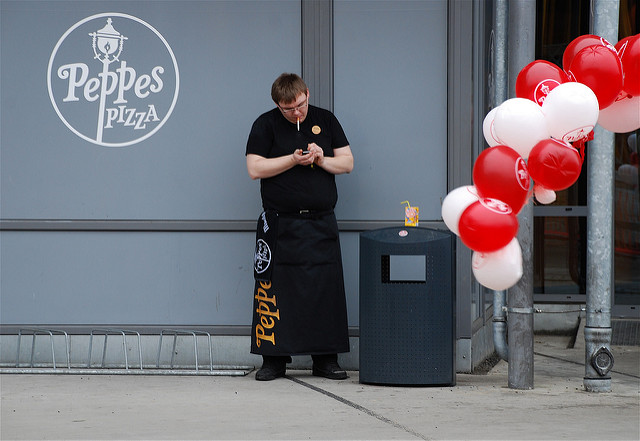Unlock the Magic in Your Story Now
Get the Free 20 questions to Ask Before Launching Your Idea workbook when you sign up for occasional updates.
Get the Free 20 questions to Ask Before Launching Your Idea workbook when you sign up for occasional updates.
A Question Of Tactics
 When marketers had no choice but to pay thousands of dollars each year for print, TV or other forms of conventional advertising they had to discern which media to invest in and why.
When marketers had no choice but to pay thousands of dollars each year for print, TV or other forms of conventional advertising they had to discern which media to invest in and why.
The good ones had a strategy. The rest dabbled.
In a digital world though, it seems like every day there’s another opportunity to expand our reach for free. A new platform to try, another channel where the eyeballs are—a place where you should have a presence. And so we invest time (which of course is not free), executing on tactics in the hope of making gains we haven’t yet clearly defined. A strategy should still come before tactics.
7 Questions to ask before allocating marketing resources
1. Why should we invest in this channel or platform and why now?
2. How will this benefit our brand?
3. How will this benefit our customers?
4. How will we measure if it’s working?
5. What’s the opportunity cost of devoting resources here and not there?
6. What other opportunities exist to invest in growth by delighting existing customers?
7. If this is the right thing to do, how are we going to be the best in the world at it?
Do you have a plan or are you just dabbling?
Image by Hernán Piñera.
Share this article
Marketing Inversion
 When Amazon.com was still in its infancy, Jeff Bezos, the company’s founder and CEO had this to say; “In the old world, you devoted 30% of your time to building a great service and 70% of your time to shouting about it. In the new world, that inverts.”
When Amazon.com was still in its infancy, Jeff Bezos, the company’s founder and CEO had this to say; “In the old world, you devoted 30% of your time to building a great service and 70% of your time to shouting about it. In the new world, that inverts.”
Shouting brought us Pop Tarts, Alka Seltzer and Sardine & Mackerel flavoured Entrée cat food, that’s 8% crude protein, packaged in the Flavor-Lock™ pouch. Building on the other hand, gave us 1-Click ordering, Kindle and free shipping.
Are you spending most of your time building or shouting?
Image by Megan Trace.
Share this article
Owning The Story
filed in Storytelling, Strategy
 The little deli around the corner just started opening an hour earlier on weekday mornings. Of course, it makes sense for a business located in a walkable neighbourhood to serve commuters who will grab a coffee on the way to work and maybe even buy a sandwich for lunch later in the day.
The little deli around the corner just started opening an hour earlier on weekday mornings. Of course, it makes sense for a business located in a walkable neighbourhood to serve commuters who will grab a coffee on the way to work and maybe even buy a sandwich for lunch later in the day.
The last time I was there I got chatting to one of the assistants.
“Why did you decide to open earlier in the morning?” I asked.
“Oh, ‘they’ (meaning the management) wanted to give it a go to see how it went,” she replied.
Sadly we disown our role as part of the collective in this way all the time. We talk about how the country, community or business needs a new direction, all the while forgetting that we are the country, the community and the business. There is no ‘they’—there is only ‘we’.
The secret of successful organisations of any kind is that they think like a team, which in turn means they act like a team. When we abandon the ‘them and us’ mindset and own our part in the story, magic happens.
Image by Alpha
Share this article
Why How Matters
 How you design the product changes how it feels to use it.
How you design the product changes how it feels to use it.
How you train your staff changes how the customer is treated.
How you answer an email changes how the recipient responds.
How much of yourself you bring to work changes how you perform.
In a world where more people understand the impact of how they do things everything changes.
Image by Benedicto de Jesus.
Share this article
Becoming Indispensable
 Every business wants to be indispensable to its customers. Every brand aspires to be the one people turn to without question. Indispensability is the holy grail of customer loyalty, just as fine summers are the secret longing of the Scottish.
Every business wants to be indispensable to its customers. Every brand aspires to be the one people turn to without question. Indispensability is the holy grail of customer loyalty, just as fine summers are the secret longing of the Scottish.
When we lived in Scotland it felt like it rained every day. If it wasn’t raining it seemed like it could, at a moment’s notice. When the sun came out people did too. Picnics were had and walks were taken. In Perth (Australia, not Scotland, where we were also lucky to live) it was the opposite.
It rarely felt like rain in Perth. The sky seemed perpetually cloudless and blue. Sunshine was taken for granted. Trips to the beach postponed until tomorrow.
And so it goes in business. When a goal is achieved and the box ticked we celebrate, and then over time we begin to take our new situation for granted. The trick to being indispensable is to strive to be that in everything we do, while having the humility to know that ultimately we’re replaceable.
Indispensable brands treat their customers with the respect a Scotsman bestows on a sunny summer day and not like a West Australian, who is often surprised and disappointed when it rains.
Image by Nick.
Share this article
Trust Vs. Hype
 Malcolm Gladwell announced his new podcast last week. Before the first episode even aired it had jumped to #2 in the iTunes charts, topping long established shows like This American Life.
Malcolm Gladwell announced his new podcast last week. Before the first episode even aired it had jumped to #2 in the iTunes charts, topping long established shows like This American Life.
It’s not just Gladwell’s record for writing bestsellers that’s driving people to the podcast. It’s that we trust him to produce nothing but great work that’s worth our time. It’s possible for one person to build a reputation the preceds him without the use of a megaphone. Gladwell has done it by earning our trust, word by word, line by line, article by article, book by book, over twenty years.
Yes, hype is more immediate than trust, but in the long run trust is a more sustainable strategy.
Image by Sebastiaan ter Burg.
Share this article
The Instructions We’re Looking For
 It was probably Stephen Covey’s ‘7 habits’ that got us addicted to the idea that success had a formula, one that could be pinned down by a number and executed in stages. Now we’re wired to seek it out. The headlines we see in our digital publications are proof. We are tempted by the notion of ‘the 5 ways’ to this or that. If it’s got a number we’re bound to click on it. And so we get more instructions promising to point to the way we’re hoping to find.
It was probably Stephen Covey’s ‘7 habits’ that got us addicted to the idea that success had a formula, one that could be pinned down by a number and executed in stages. Now we’re wired to seek it out. The headlines we see in our digital publications are proof. We are tempted by the notion of ‘the 5 ways’ to this or that. If it’s got a number we’re bound to click on it. And so we get more instructions promising to point to the way we’re hoping to find.
Of course, you know the punchline. The successes we aspire to and try to emulate are aspirational precisely because they can’t be imitated. From Godin to Gladwell, Amazon to Apple, those that pioneer don’t look for a manual. They create a path they believe is worth walking.
The hard part isn’t knowing exactly how to do the thing.
It’s caring enough to decide that you should.
Image by Shelia.
Share this article
Getting On Your Customer’s Radar
 Many brands believe the biggest challenge they have is creating more brand awareness. If they could only get on the radar of potential customers then many of their problems would disappear. And yet brands like Macy’s and Ralph Lauren that have built awareness for decades are struggling to remain viable. Their biggest problem isn’t getting on the customer’s radar, it is (and has been for some time) keeping the customer on their radar.
Many brands believe the biggest challenge they have is creating more brand awareness. If they could only get on the radar of potential customers then many of their problems would disappear. And yet brands like Macy’s and Ralph Lauren that have built awareness for decades are struggling to remain viable. Their biggest problem isn’t getting on the customer’s radar, it is (and has been for some time) keeping the customer on their radar.
The brands that have thrived and become important to us in recent times remain relevant because they see us, not because they made us more aware of them. We succeed by understanding how to create value, joy and connection not simply by being more visible.
Image by Anthony Quintano.
Share this article
The Heart Of Customer Loyalty
 Despite everything we know about the benefits of fostering customer loyalty, most of our marketing is designed to change what people think or do in the short term. We change the label from white to yellow to get a millisecond more attention. We offer discounts on product lines we want to shift and when we run out of reasons for people to buy, we invent them.
Despite everything we know about the benefits of fostering customer loyalty, most of our marketing is designed to change what people think or do in the short term. We change the label from white to yellow to get a millisecond more attention. We offer discounts on product lines we want to shift and when we run out of reasons for people to buy, we invent them.
If you’re playing the long game you have to dig deeper and think about changing how people feel—not just about your brand, but about themselves in its presence. A beloved brand aspires to change how people feel, not only to manipulate what people think and do.
People come back because they feel like it, not because we made them.
Image by Baily Cheng.
 The sign had been hastily scrawled in blue biro. The letters gone over and over again to make them more visible to the passer-by. A short cut, that in the end didn’t give the benefit of a short cut at all.
The sign had been hastily scrawled in blue biro. The letters gone over and over again to make them more visible to the passer-by. A short cut, that in the end didn’t give the benefit of a short cut at all.